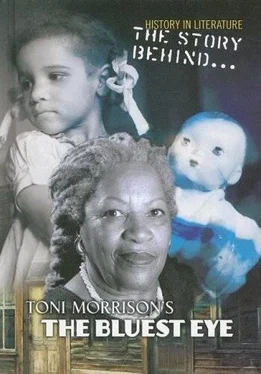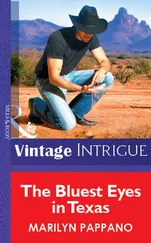"Sugar-coated whores," they called them, and did not yearn to be in their shoes. Their only respect was for what they would have described as "good Christian colored women." The woman whose reputation was spotless, and who tended to her family, who didn't drink or smoke or run around. These women had their undying, if covert, affection. They would sleep with their husbands, and take their money, but always with a vengeance. Nor were they protective and solicitous of youthful innocence. They looked back on their own youth as a period of ignorance, and regretted that they had not made more of it. They were not young girls in whores' clothing, or whores regretting their loss of innocence.
They were whores in whores' clothing, whores who had never been young and had no word for innocence. With Pecola they were as free as they were with each other. Marie concocted stories for her because she was a child, but the stories were breezy and rough. If Pecola had announced her intention to live the life they did, they would not have tried to dissuade her or voiced any alarm. "You and Dewey Prince have any children, Miss Marie?"
"Yeah. Yeah. We had some." Marie fidgeted. She pulled a bobby pin from her hair and began to pick her teeth. That meant she didn't want to talk anymore. Pecola went to the window and looked down at the empty street. A tuft of grass had forced its way up through a crack in the sidewalk, only to meet a raw October wind. She thought of Dewey Prince and how he loved Miss Marie. What did love feel like? she wondered.
How do grown-ups act when they love each other? Eat fish together??! Into her eyes came the picture of Cholly and Mrs.
Breedlove in bed. He making sounds as though he were in pain, as though something had him by the throat and wouldn't let go.
Terrible as his noises were, they were not nearly as bad as the no noise at all from her mother. It was as though she was not even there. Maybe that was love. Choking sounds and silence.
Turning her eyes from the window, Pecola looked at the women.
China had changed her mind about the bangs and was arranging a small but sturdy pompadour. She was adept in creating any number of hair styles, but each one left her with a pinched and harassed look. Then she applied makeup heavily. Now she gave herself surprised eyebrows and a cupid-bow mouth. Later she would make Oriental eyebrows and an evilly slashed mouth. Poland, in her sweet strawberry voice, began another song: I know a boy who is sky-soft brown I know a boy who is sky-soft brown The dirt leaps for joy when his feet touch the ground. His strut is a peacock His eye is burning brass His smile is sorghum syrup drippin' slow-sweet to the last I know a boy who is sky-soft brown Marie sat shelling peanuts and popping them into her mouth.
Pecola looked and looked at the women. Were they real? Marie belched, softly, purringly, lovingly.
My daddy's face is a study. Winter moves into it and presides there. His eyes become a cliff of snow threatening to avalanche; his eyebrows bend like black limbs of leafless trees. His skin takes on the pale, cheerless yellow of winter sun; for a jaw he has the edges of a snowbound field dotted with stubble; his high forehead is the frozen sweep of the Erie, hiding currents of gelid thoughts that eddy in darkness. Wolf killer turned hawk fighter, he worked night and day to keep one from the door and the other from under the windowsills. A Vulcan guarding the flames, he gives us instructions about which doors to keep closed or opened for proper distribution of heat, lays kindling by, discusses qualities of coal, and teaches us how to rake, feed, and bank the fire. And he will not unrazor his lips until spring.
Winter tightened our heads with a band of cold and melted our eyes. We put pepper in the feet of our stockings, Vaseline on our faces, and stared through dark icebox mornings at four stewed prunes, slippery lumps of oatmeal, and cocoa with a roof of skin.
But mostly we waited for spring, when there could be gardens. By the time this winter had stiffened itself into a hateful knot that nothing could loosen, something did loosen it, or rather someone. A someone who splintered the knot into silver threads that tangled us, netted us, made us long for the dull chafe of the previous boredom. This disrupter of seasons was a new girl in school named Maureen Peal. A high-yellow dream child with long brown hair braided into two lynch ropes that hung down her back.
She was rich, at least by our standards, as rich as the richest of the white girls, swaddled in comfort and care. The quality of her clothes threatened to derange Frieda and me. Patent-leather shoes with buckles, a cheaper version of which we got only at Easter and which had disintegrated by the end of May.
Fluffy sweaters the color of lemon drops tucked into skirts with pleats so orderly they astounded us. Brightly colored knee socks with white borders, a brown velvet coat trimmed in white rabbit fur, and a matching muff. There was a hint of spring in her sloe green eyes, something summery in her complexion, and a rich autumn ripeness in her walk. She enchanted the entire school.
When teachers called on her, they smiled encouragingly. Black boys didn't trip her in the halls; white boys didn't stone her, white girls didn't suck their teeth when she was assigned to be their work partners; black girls stepped aside when she wanted to use the sink in the girls' toilet, and their eyes genuflected under sliding lids. She never had to search for anybody to eat with in the cafeteria-they flocked to the table of her choice, where she opened fastidious lunches, shaming our jelly-stained bread with egg-salad sandwiches cut into four dainty squares, pink-frosted cupcakes, sticks of celery and carrots, proud, dark apples. She even bought and liked white milk. Frieda and I were bemused, irritated, and fascinated by her. We looked hard for flaws to restore our equilibrium, but had to be content at first with uglying up her name, changing Maureen Peal to Meringue Pie.
Later a minor epiphany was ours when we discovered that she had a dog tooth-a charming one to be sure-but a dog tooth nonetheless. And when we found out that she had been born with six fingers on each hand and that there was a little bump where each extra one had been removed, we smiled. They were small triumphs, but we took what we could get-snickering behind her back and calling her Six-finger-dog-tooth-meringue-pie. But we had to do it alone, for none of the other girls would cooperate with our hostility. They adored her. When she was assigned a locker next to mine, I could indulge my jealousy four times a day. My sister and I both suspected that we were secretly prepared to be her friend, if she would let us, but I knew it would be a dangerous friendship, for when my eye traced the white border patterns of those Kelly-green knee socks, and felt the pull and lack of my brown stockings, I wanted to kick her. And when I thought of the unearned haughtiness in her eyes, I plotted accidental slammings of locker doors on her hand. As locker friends, however, we got to know each other a little, and I was even able to hold a sensible conversation with her without visualizing her fall off a cliff, or giggling my way into what I thought was a clever insult. One day, while I waited at the locker for Frieda, she joined me. "Hi."
"Hi."
"Waiting for your sister?"
"Uh-huh."
"Which way do you go home?"
"Down Twenty-first Street to Broadway."
"Why don't you go down Twenty-second Street?"
"'Cause I live on Twenty-first Street."
"Oh. I can walk that way, I guess. Partly, anyway."
"Free country." Frieda came toward us, her brown stockings straining at the knees because she had tucked the toe under to hide a hole in the foot. "Maureen's gonna walk part way with us." Frieda and I exchanged glances, her eyes begging my restraint, mine promising nothing. It was a false spring day, which, like Maureen, had pierced the shell of a deadening winter. There were puddles, mud, and an inviting warmth that deluded us. The kind of day on which we draped our coats over our heads, left our galoshes in school, and came down with croup the following day. We always responded to the slightest change in weather, the most minute shifts in time of day. Long before seeds were stirring, Frieda and I were scruffing and poking at the earth, swallowing air, drinking rain… As we emerged from the school with Maureen, we began to moult immediately. We put our head scarves in our coat pockets, and our coats on our heads. I was wondering how to maneuver Maureen's fur muff into a gutter when a commotion in the playground distracted us. A group of boys was circling and holding at bay a victim, Pecola Breedlove. Bay Boy, Woodrow Cain, Buddy Wilson, Junie Bug-like a necklace of semiprecious stones they surrounded her.
Читать дальше











